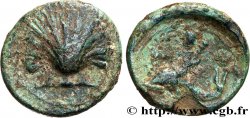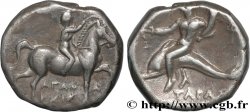bgr_228859 - CALABRIA - TARAS Nomos ou statère
Not available.
Item sold on our e-shop (2013)
Price : 180.00 €
Item sold on our e-shop (2013)
Price : 180.00 €
Type : Nomos ou statère
Date: c. 250-235 AC.
Mint name / Town : Tarente, Calabre
Metal : silver
Diameter : 19 mm
Orientation dies : 12 h.
Weight : 6,26 g.
Rarity : R1
Coments on the condition:
Exemplaire sur un flan centré avec les inscriptions visibles. Joli droit. Revers un peu court sur la tête de Taras et la Niké le couronnant. Une fine patine grise avec des reflets dorés recouvre l’exemplaire
Catalogue references :
Predigree :
Cet exemplaire provient de MONNAIES 41, n° 16
Obverse
Obverse description : Cavalier nu, coiffé d’un casque attique à triple aigrette, galopant à droite, tenant une javeline transversale de la main droite, un bouclier de la main gauche.
Obverse legend : QI/ ARISTOK.
Reverse
Reverse description : Taras nu, chevauchant un dauphin à gauche, vu de face, la chlamyde flottant sur les épaules, tenant un trident de la main gauche surmonté d’une petite Niké volant à droite et le couronnant ; un gouvernail couché sous le dauphin.
Reverse legend : [TARAS].
Commentary
Comme sur les exemplaires de la collection Vlasto ou ceux de l’American Numismatic Society, les visages ne semblent pas gravés sur ce type, mais seulement suggérés.








 Report a mistake
Report a mistake Print the page
Print the page Share my selection
Share my selection Ask a question
Ask a question Consign / sell
Consign / sell
 Full data
Full data



